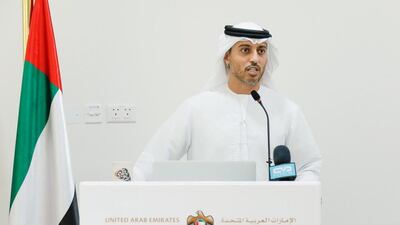The UAE faces a "challenge" to prevent job-seekers conning their way into the country with faked degree certificates, a government minister has said.
Minister of State for Higher Education, Dr Ahmad Al Falasi, said the country's status as a "top destination" provides a lure for people to forge documentation in order to land lucrative positions.
Dr Al Falasi made the admission at a Federal National Council (FNC) meeting - after revealing the ministry thwarted 143 bids to pass off false qualifications as genuine last year.
He said the Ministry of Higher Education was committed to ensuring cases of potential forgery don't slip through the net.
“Today the UAE provides big job opportunities and Dubai is considered a top destination for job seekers, so definitely there is a challenge and some might resort to forging certificates,” said Dr Al Falasi.
“Our job as the Ministry of Higher Education is to investigate whether a certificate is genuine on behalf of recruiters.”
Dr Al Falasi spoke out after FNC member Hamad Al Rahoomi raised concern over claims that some Emiratis were coming back from studying overseas with forged certificates.
“What is the ministry doing to confirm the validity of academic certificates issued abroad?” said Mr Al Rahoomi.
Dr Al Falasi said no forged degrees had been accredited by the ministry.
“Before accrediting any certificate, the ministry asks for stamps from concerned parties, like the embassy of the country the degree was issued at, and then we contact the university itself and confirm whether the student graduated from there,” he said.
The FNC meeting heard it is mandatory at government and semi-government organisations in Abu Dhabi for an employee to present a degree accredited by the ministry before getting recruited.
However, in some emirates, private companies do not have that prerequisite.
Mr Al Rahoomi said it would be unjust for Emiratis who have genuine degrees to receive an equal salary of those who present faked certification, particularly at a time when the government is leading a drive to encourage more Emiratis to work in the private sector.
Dr Al Falasi explained that degrees are not always rejected due to a forgery being carried out, but can fail to win approval because of issues such as the number of academic hours completed and the content of the degree not meeting the required standards set by the ministry.
During the FNC meeting, members also voiced concerns over the number of Emirati students failing foundation courses, a bridge between school and university for those who lack enough English to start university.
FNC member Saeed Al Remeithi said many Emirati students fail foundation courses at public universities.
Only last April, the FNC heard The UAE is spending millions of dirhams on English lessons for 18-year-olds who have left school without sufficient skills in English.
Dr Al Falasi said the number of students who pass foundation courses has risen significantly in recent years.
In 2013, only 40 per cent of students passed the course, but the figure rose to 70 per cent over the following four years, he said.
The minister said a number of measures have been introduced to support students who are performing poorly.
“First of all, every high school graduate is guaranteed a seat in university and a major degree that is suitable for their level, even if his average score only exceeded the passing grade by 1 per cent.
“Those who are weak academically or language-wise they have their own programs to assist them. So we accommodate all students.”
Students who continue to fail are referred to universities that are more suitable for their skills.


